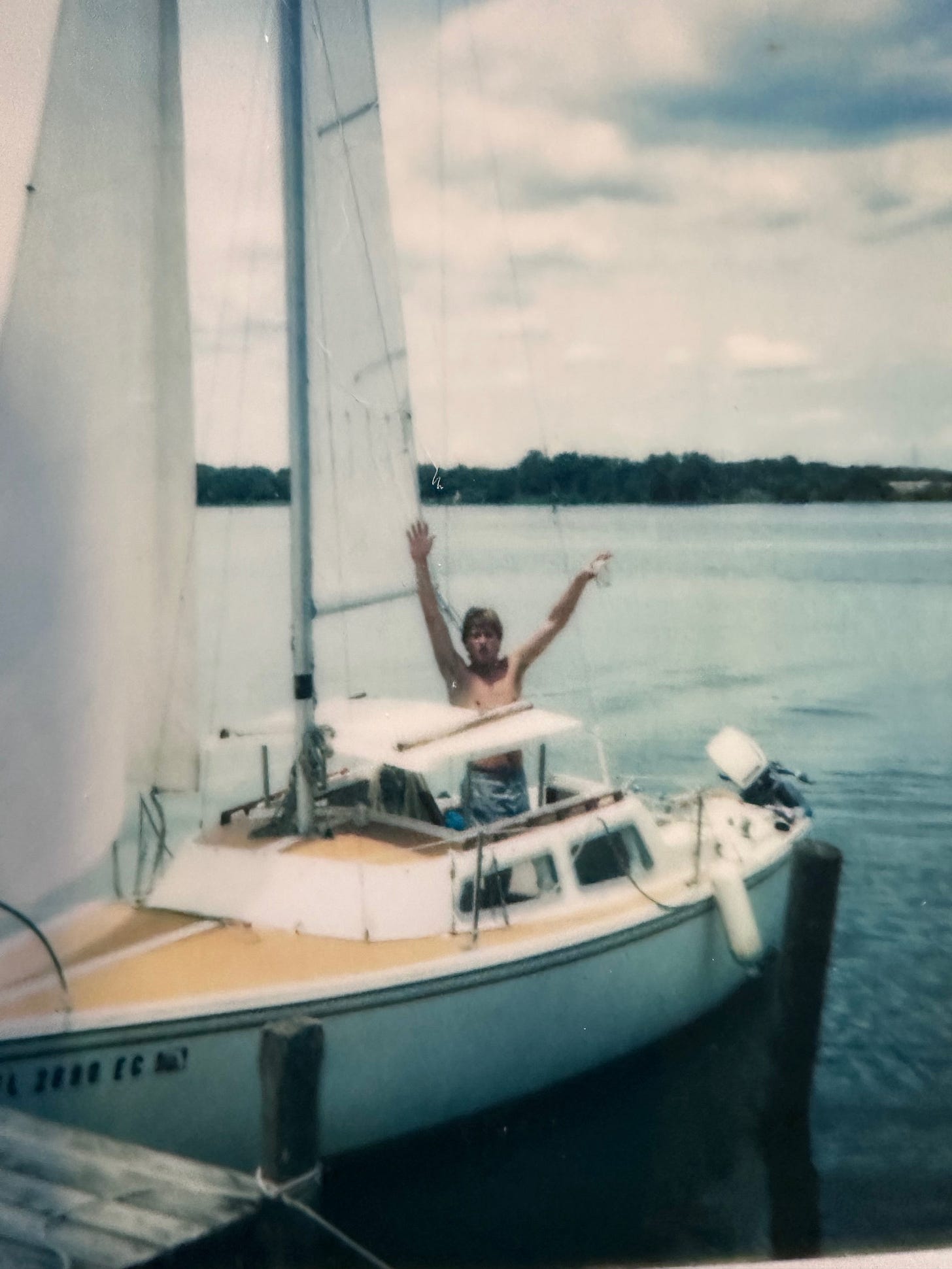“Then we will no longer be infants, tossed back and forth by the waves, and blown here and there by every wind of teaching...” - Ephesians 4:14
There’s something deeply humbling about the wind. You can’t see it, stop it, or predict it with any real certainty. And yet, a good sailor doesn’t worry about what the wind is doing—he just adjusts the sails and carries on.
Years ago, when I first learned how to sail, I remember the moment the boat caught wind for the first time. The peaceful drifting in still water was replaced by sudden movement. The sail snapped to life, the hull tilted sharply, and I instinctively wanted to pull away from the edge. But the instructor yelled, “Hike out!” So, with my heart pounding, I swung my upper body over the high side of the boat, hanging off a rope just a few feet above the rushing water. That unnatural trust—leaning into the wind when everything in me wanted to resist it—was the beginning of learning how to sail.
The motivational speaker Jim Rohn once said, “It’s not the direction of the wind that determines your destination, but the set of the sail.” The same winds—of trouble, change, blessing, and uncertainty—blow on everyone. But not everyone ends up in the same place. What makes the difference is how we respond. In that way, life is not unlike sailing. You may not be able to control what comes at you, but you can choose how you respond. And the way you adjust reveals where your trust is anchored.
Biblical parallels to setting the sail
“We must pay the most careful attention... so that we do not drift away.” - Hebrews 2:1
Spiritual drift is rarely sudden. It’s subtle, almost imperceptible. Like a boat left unattended, it happens slowly as the current pulls. Without intention, conviction, or course correction, we lose direction. But Scripture doesn’t leave us adrift. The call is clear: pay careful attention. That’s the sailor’s mindset. You watch the wind. You adjust the lines. You trim the sail. The Christian life isn’t passive—it’s alert, responsive, and rooted in the truth. James tells us, “The one who doubts is like a wave of the sea, blown and tossed by the wind.” (James 1:5–6).
Doubt, in this sense, isn’t just uncertainty—it’s indecision. It’s the refusal to commit the heart and mind to the wisdom God freely gives. Just as a boat with no rudder or sail is at the mercy of the sea, the one who lacks trust and direction is swept up in whatever pressure or emotion comes next. God invites us to something better. He offers wisdom—not as a vague idea, but as a reliable compass. Our role is to take it, trust it, and trim the sail accordingly.
But not all winds are storms. Some blow gently. Some come with the smooth voice of cultural compromise or half-truths dressed in religious language. But if we’re not grounded—if we haven’t learned how to read the wind and adjust by the Word—we’ll be moved by every shift in the breeze. Maturity in Christ is stability in doctrine. It’s discernment in action. It’s knowing when to let the sail out, when to pull it tight, and when to hold steady.
The art of sailing as spiritual metaphor
When you’re sailing into the wind—a move called tacking—you zigzag back and forth. And you pull the sail in tight. The closer you try to sail into the wind, the more control and tension are required. Every adjustment matters. Every move is deliberate. And when done right, on the precipice of the tipping point, the boat reaches its maximum speed.
Spiritually, we experience this when we’re going through trials, conflict, or spiritual warfare. The path forward isn’t direct, and it often feels like we’re flirting with disaster. But this is when we must hold most tightly to the truth. As Paul told Timothy, “Endure hardship… discharge all the duties of your ministry” (2 Timothy 4:5). Tacking into the wind of trials builds resilience. It forms us, and if we respond correctly, usually forms us faster and stronger than easier times ever could.
Those easier times are like sailing downwind. When the wind is at your back—when circumstances align or the Spirit seems to carry you forward—the strategy changes. You let the sails out. You open them wide to catch as much wind as possible. You bask in God’s grace, thank Him, and give Him the glory. That doesn’t mean you abandon vigilance. It means you respond in step with the power propelling you.
And then there’s the moment every true sailor loves: when the boat heels over hard and you have to hike out. This is a test of trust in what you know and believe about the task at hand. It feels unnatural. Vulnerable. But in reality, it’s what helps keep the boat upright at speed.
Faith is like that. Obedience is rarely comfortable in the moment. Trust will take you beyond the safety of the deck. But Hebrews reminds us, “Faith is confidence in what we hope for and assurance about what we do not see” (Hebrews 11:1).
Flapping your jib – unwise words in hard winds
There’s an old saying about loose talk among sailors: “Stop flapping your jib.” It means you need to shut up or let something go. A jib is the front sail on a boat—if it’s not trimmed properly, it flaps in the wind, making a loud, useless racket. It’s not helping the boat move and it can damage the sail or rigging.
In spiritual terms, this happens when our speech becomes untethered—when we speak out of anxiety, pride, or fear instead of trust in God. In moments of fear or confusion, we may speak fear to ourselves and doubt to others. And in moments of ease, we’re just as likely to drift into careless boasting or self-congratulation. Either way, we’re flapping the jib—making noise, not headway.
Scripture speaks directly to this kind of foolish speech. James writes, “The tongue is a small part of the body, but it makes great boasts… it corrupts the whole body, sets the whole course of one’s life on fire” (James 3:5–6). And Proverbs reminds us, “When words are many, sin is not absent, but he who holds his tongue is wise” (Proverbs 10:19).
Our words, even when spoken only to ourselves, carry weight. They can anchor us in fear, or they can steady us in hope. They can magnify the storm, or they can reflect the calm assurance that Christ is still with us in the boat.
Staying the course when things fall apart – a true story
The Christian life is not about controlling the wind. It’s about setting the sail. It's about attention, intention, and determined endurance. But there will be times when that’s hard. I’ll wrap things up with a final sailing analogy from my past.
One late spring afternoon, the wind was piping, and small whitecaps scattered across the choppy lake. My brother and I decided it was time to test our sailing skills. Within minutes, we were out on the water, tacking hard into the wind. It was glorious. The old boat—a 24-foot Catalina pocket cruiser—was flying. For the first time, we felt it up on plane across the water’s surface, skimming the waves with speed and grace.
Then the unthinkable happened.
The tiller—the long, thick handle we used to steer—snapped. The boat jerked violently and spun around 180 degrees. My brother, who had been hiked out over the side, went swinging across the deck and crash-landed against the cabin. I ended up sprawled in the cockpit floor. The boat was suddenly adrift, bobbing and bouncing in the wind. We were stunned. And disappointed. That was the most awesome sailing we had ever experienced—and it had been cut short by a broken piece of wood. But not for long.
We dropped the main sail, let out the jib just enough to catch a small bit of wind and nudged the stub of the broken tiller with our feet to steer, coaxing the boat back to the dock. Once there, we quickly drilled new holes into what remained of the tiller, reattached it to the rudder, and set out again—scraped, bruised, and determined not to miss the chance to experience that awesome wind. And you know what? It was even better the second time.
Today, I find a metaphorical lesson in that experience for our spiritual life: when you live fully in the Lord—when you trust His truth, take risks in faith, and never give up on God’s merciful grace—it’s an amazing experience. It will not always go smoothly. Things will break. Winds will shift. But you will develop a hunger for the joy of being fully alive in Christ that will overcome the fear that tries to grip you when unexpected trials happen. We were designed for that kind of faith, that kind of life. You were made to ride the wind, Christian.
Consider supporting my work by making a one-time donation through PayPal.
Thank you for your support!
Email your comments or suggestions to: mail@christiansoldier21.org






That was a great story about sailing and trusting God, sailing sounds like a lot of fun. Thanks for the encouragement.
Wonderful metaphor! I have often reflected on the “zigzags” in my life, necessary to sail into the wind. As I look back, I see God’s straight line to the present from where I started, even though there were some “hard right turns” along the way. Really appreciated the description of the precision and resilience required in sailing!